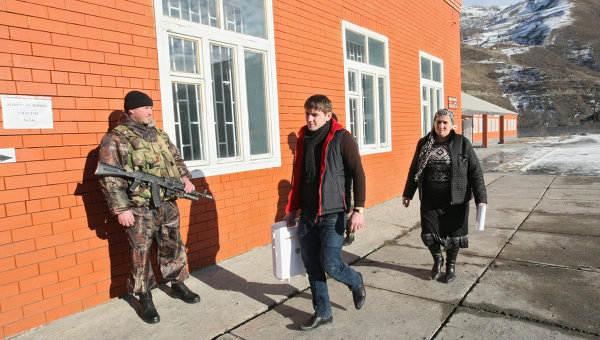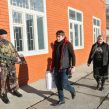
Russian Parliamentary Election Results in the North Caucasus Questioned
Publication: Eurasia Daily Monitor Volume: 8 Issue: 222
By:

On December 4, parliamentary elections were held in Russia. Russian observers say that the manifestly exaggerated victory of the ruling United Russia party in the republics of the North Caucasus played a key role in enabling the ruling United Russia party to win over 50 percent of the seats. The North Caucasus’ vote was more important this time than in previous elections, in 2007, when United Russia still exercised considerable clout over popular opinion across Russia. The ruling party partially compensated for its profound loss of popularity in ethnic Russian regions with the help of the North Caucasian vote, which is largely seen as having been fraudulent, writes the well-known Russian analyst on the North Caucasus, Konstantin Kazenin (https://slon.ru/russia/pochemu_kavkaz_kormit_edinuyu_rossiyu_-721870.xhtml, December 5).
Chechnya and Dagestan were the two top Russian regions where United Russia added votes in comparison to the 2007 elections. In Chechnya, the ruling party received 99.5 percent of the vote this time, 0.1 percent more than in 2007. In Dagestan, the party improved its performance from 89.4 in 2007 to 91.4 this time. By contrast, in ten ethnic Russian regions, United Russia’s results were on average approximately 30 percent lower than in 2007, amounting to what appears to be a crushing defeat for the Kremlin (https://slon.ru/russia/karta_velikoy_pobedy-721906.xhtml?page=6#pager, December 6).
The rigging of the vote took on perhaps its most grotesque forms in Chechnya, due to the republic’s quasi-dictatorial regime installed and supported by Moscow. According to Chechen officials, voter turnout was 99.45 percent. An anonymous Chechen medical worker told the Kavkazsky Uzel (Caucasian Knot) website that the government made him and his co-workers go to the balloting stations, threatening to delay their wages if they did not show up. Observers noted that government employees went to polling stations and stayed there all day in an apparent attempt to make it appear as if there were crowds of voters (https://www.kavkaz-uzel.ru/articles/197029/, December 5). On December 2, Chechen officials announced that the total number of registered voters in the republic was 608,797. On December 5, summarizing the election results, Chechen officials announced that a total of 611,099 ballots had been cast – that is, 2,302 more ballots cast than the total number of registered voters. Chechnya’s central electoral commission quickly responded to the criticism by raising the official number of voters to 614,109 (https://www.kavkaz-uzel.ru/articles/197042/, December 5).
On December 6, the Russian Communist Party’s branch in Dagestan staged a protest in Makhachkala against the elections, which they said were unfair and rigged. “False elections – rotten authorities” was one of their slogans. Members of the Russian liberal party Yabloko joined the Communists in protesting. The Communists said they were supported by half of the republic’s population in the December 4 election, while according to the official results they won just 7.5 percent of the vote. However, since only 50-70 people participated in the protest, the republican authorities are unlikely to pay attention to them (https://dagestan.kavkaz-uzel.ru/articles/197114/, December 6).
In Kabardino-Balkaria, 98.38 percent of the republic’s registered voters went to the polls, with 81.91 percent of them voting for United Russia. Out of the other six parties that participated in the election, only the Russian Communist Party’s branch in Kabardino-Balkaria cleared the minimum seven percent required for State Duma representation, winning 17.63 percent of the vote in the republic (https://kabardino-balkaria.kavkaz-uzel.ru/articles/197067/, December 5).
Independent observers in Ingushetia reported an extremely low voter turnout – about 10 percent – as well as numerous cases of electoral law violations (https://ingushetia.kavkaz-uzel.ru/articles/197021/, December 5). Officials in Ingushetia nevertheless reported a record voter turnout of 90 percent, of which 78.1 percent voted for United Russia party. Simultaneously with the national parliamentary elections, Ingushetia also held elections to its regional parliament. Even that election apparently evoked little interest from the republic’s voters (https://ingushetia.kavkaz-uzel.ru/articles/197069/, December 5).
Still, there were some differences even in the North Caucasus this year. The Internet became the primary space for criticism of the election results in the North Caucasus. Malik Saidullaev, a Chechen businessman living in Moscow who ran for the Chechen presidency against Akhmad Kadyrov in 2003 but was removed from the race, commented on Facebook: “I know for absolutely sure that the existing authorities will not receive even 3 percent of votes in the North Caucasian republics. So this information about voting says that these elections were farcical, which will turn this government into rogues!” (https://www.facebook.com/profile.php?id=100000881318919, December 6).
Konstantin Kazenin dismissed the usual explanations by the Moscow-based experts. “The high Caucasian percentage points for United Russia are habitually attributed to the backwardness of political life in the Northern Caucasus, by ‘Turkmen’ traditions [reference to the extremely autocratic regime in Turkmenistan] that supposedly reign in this part of Russia,” he wrote. “This explanation would be plausible only if we did not compare the Russian State’s Duma elections to other events in the North Caucasus Federal District.” In fact, Kazenin pointed out, even in municipal elections in Dagestan, the electoral battles are fierce and with open-ended, unpredictable results. Voting for United Russia is seen in the North Caucasus as an expression of loyalty to Moscow that will help the region improve its bargaining position with the Russian authorities (https://slon.ru/russia/pochemu_kavkaz_kormit_edinuyu_rossiyu_-721870.xhtml, December 5).
The Russian expert, of course, is being modest in this case. The Moscow-installed authorities in the North Caucasus have no other choice but to provide winning results for the ruling party. They can hardly use this as a bargaining chip. Rather, the reverse is true: Moscow could use bad results for the ruling party as a pretext for dismissing regional governors. In the current situation, however, when the North Caucasus vote has become so pivotal, Russian nationalists and democrats alike might focus on how voting in the North Caucasus contributes to inhibiting democracy’s progress in Russia. So, paradoxically, the rigged votes in the North Caucasus contribute to preventing the democratic evolution of Russia, while official Moscow’s demands and expectations of the North Caucasus elites contribute to hampering the political development of this region.




